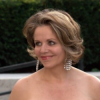Renee Fleming

Renee Fleming
Renée Flemingis an American opera singer and soprano whose repertoire encompasses Richard Strauss, Mozart, Handel, bel canto, lieder, French opera and chansons, jazz and indie rock. Fleming has a full lyric soprano voice. She has performed coloratura, lyric, and lighter spinto soprano operatic roles in Italian, German, French, Czech, and Russian, aside from her native English. She also speaks fluent German and French, along with limited Italian. Her signature roles include Countess Almaviva in Mozart's Le nozze di Figaro, Desdemona...
NationalityAmerican
ProfessionOpera Singer
Date of Birth14 February 1959
CountryUnited States of America